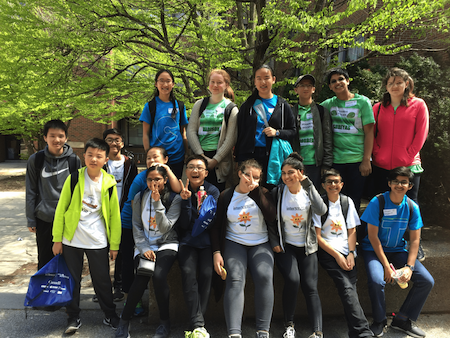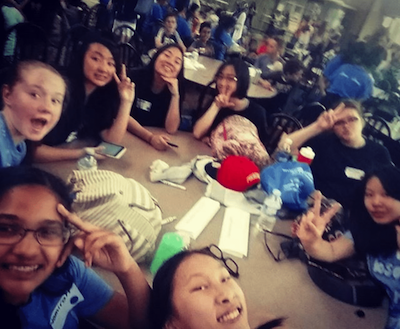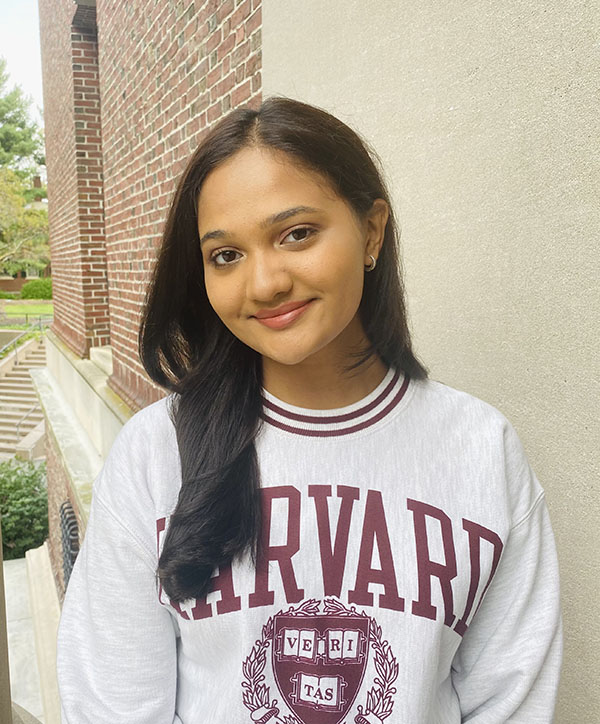From the Let's Talk Science Challenge to Harvard: Namirah Quadir's Inspiring STEM Journey
Third-year Harvard University neuroscience student Namirah Quadir always knew she was interested in the sciences. “No one in my family is really in STEM: my father is more in political science, my mother is an artist, and my older sister went into business,” Quadir confesses. But her family’s lack of STEM background did nothing to quell her scientific curiosity. “When I was little, I used to do these little science experiments,” says Quadir. “I remember, I thought I had invented these tissues with lotion in them, and then a few years later, Puffs came out!” She was always experimenting around the house, doing activities from the science books her parents bought her, and refining her scientific method.
It wasn’t until elementary school that her passion for science exploded during her three years competing in the Let’s Talk Science Challenge. A voracious learner, Quadir was always looking for something extra to do at school to challenge her learning; she would even help out her sister (eight years her senior) with her high school homework. “The Let’s Talk Science Challenge was hard,” Quadir recalls fondly. “It was a huge handbook of all this information, and you couldn’t just read it once, or read it twice, or read it three times; you had to really understand what was going on.” The material she studied for the Let’s Talk Science Challenge made her feel more connected to what she was learning in school and prepared her for high school and beyond. “I think it really became evident to me through the Let’s Talk Science Challenge that I needed something that was really, really challenging for me to stay motivated,” explains Quadir, pointing out how the Let’s Talk Science Challenge, while difficult, was fun and stimulating.


“One of my favourite memories has to be winning,” recollects Quadir. “It was in grade 7…and our team was named ‘Absolute Zero Cool.’” After months of analyzing the guidebook, making up practice design challenges, and studying both in and out of school, Quadir’s team sat anxiously, dressed up in their “Zero Cool” nerdy outfits of glasses and pigtails, waiting for the winner to be announced. When their name was called, it felt like a dream come true. “That was one of the best moments of my life,” Quadir says. “It was so wonderful to come back home and tell my parents, ‘We won the science challenge!’”
The contest itself isn’t the only thing Quadir remembers fondly, as the social aspect of the competitions was just as important as the academic content. Quadir recalls the Challenges she attended as incredibly high energy: “You could see the excitement in everyone’s eyes.” Not only was the Let’s Talk Science Challenge a great place to build team spirit and make new friends, but interacting with the Let’s Talk Science volunteers were also profound moments for Quadir. “Meeting a lot of the volunteers was a really wonderful experience for me,” she says. “Seeing someone talking to you, who’s in university, studying something that you want to study, is a dream come true. It was like: ‘Oh my gosh— she can do it, maybe I can do it too!’” Quadir also stressed the importance of representation in STEM, something she felt she saw at the Challenges: “For me, one of the reasons I loved the Let’s Talk Science Challenge is because I would go to these competitions, and I’d see volunteers who looked like me, who were doing what I wanted to do.” Quadir felt it was a powerful experience getting to interact with role models in STEM in whom she could see herself.
Quadir believes a basic level of understanding in STEM is “absolutely critical” for everyone to have so they can be thoughtful and engaged citizens. Especially in the face of crises like the COVID-19 pandemic, she says that STEM education and literacy are of the utmost importance to enable people to face such big problems in productive and equitable ways. In March 2020, Quadir took on the challenge of managing Project Northern Lights, a non-profit dedicated to supplying personal protective equipment to marginalized communities across Canada throughout the pandemic. The compassion she saw at Project Northern Lights is something she hopes we can all have in the future: “I think beyond anything else if we can just show a little more compassion… that’s the only way we can really solve these interdisciplinary global issues that are affecting people.” She stresses the importance of thinking outside of yourself and seeing how your actions can affect others for the better. “I always want to make sure that the impact I’m making is far greater than myself,” says Quadir. “I think it is important to dream big and think of how you can truly and deeply impact a large number of people through whatever you want to do.”
As she has moved up in her life, from the Let’s Talk Science Challenge in grade school to Project Northern Lights to neuroscience at Harvard, Quadir’s appreciation for STEM has only grown. “Science is everywhere, and how I see science is it is making sense of the world around us,” says Quadir. “I think that there is a lot of creation of knowledge when it comes to things like literature and entertainment and art…but through science, we have a new lens for analyzing and understanding.” Through everything, she has remained grateful to Let’s Talk Science and all the people she had the chance to meet through her time competing in the Challenge. “Meeting older students who I could see myself in was so important to me,” says Quadir. “It showed me what was possible.” As she continues her studies, Quadir hopes she can inspire more young people the way Let’s Talk Science and all of its volunteers have inspired her.

Let's Talk Science is celebrating our 30th Anniversary and we are excited to continue making an impact in the lives of children and youth across Canada for another 30 years - or longer.
Join us in shaping the future by contributing to our fundraising goal of raising $30 Million in three years from industry, individuals and foundations through our Inspire – Educate – Innovate Fundraising Campaign. Together, we can continue to make a difference.